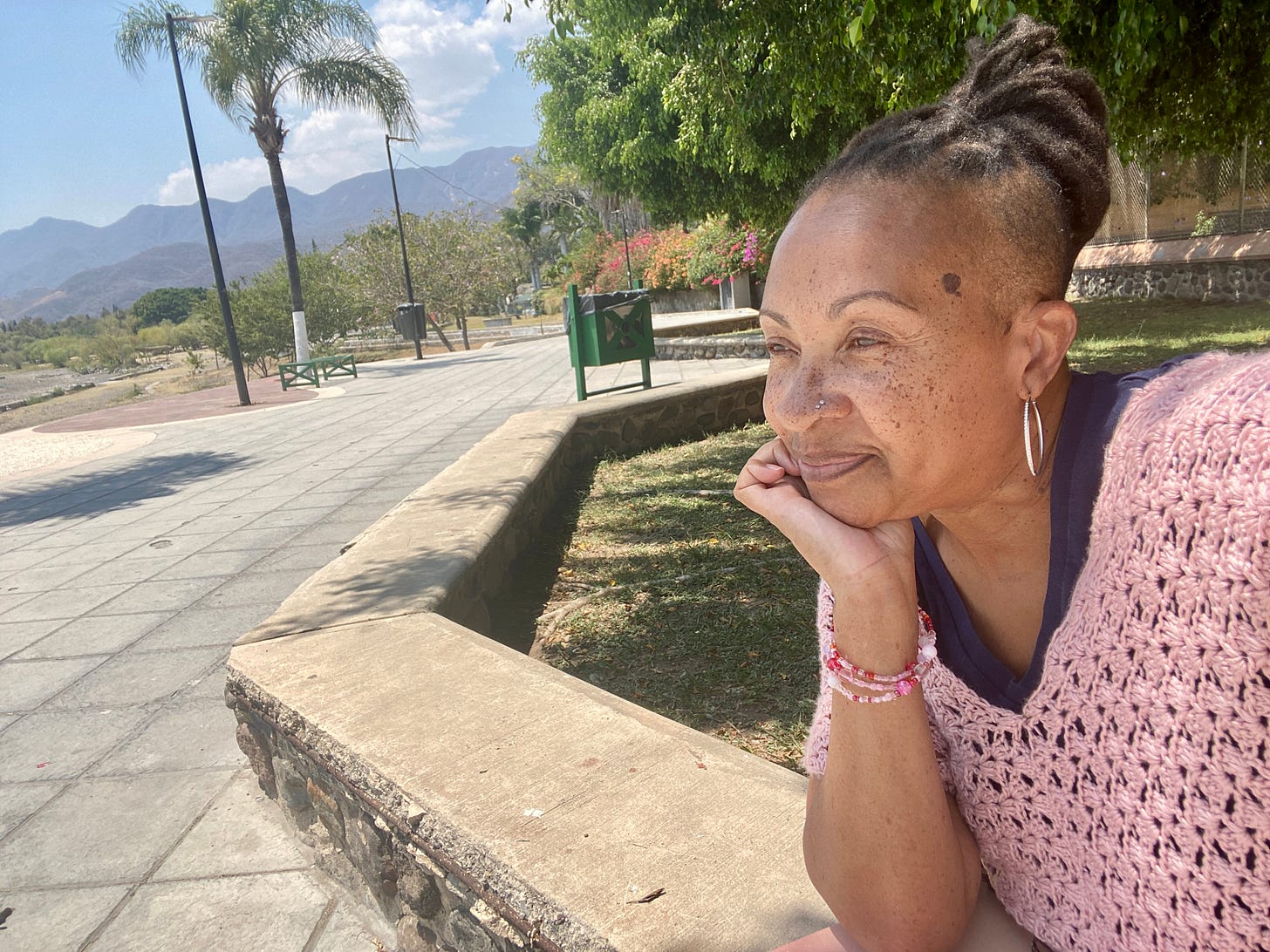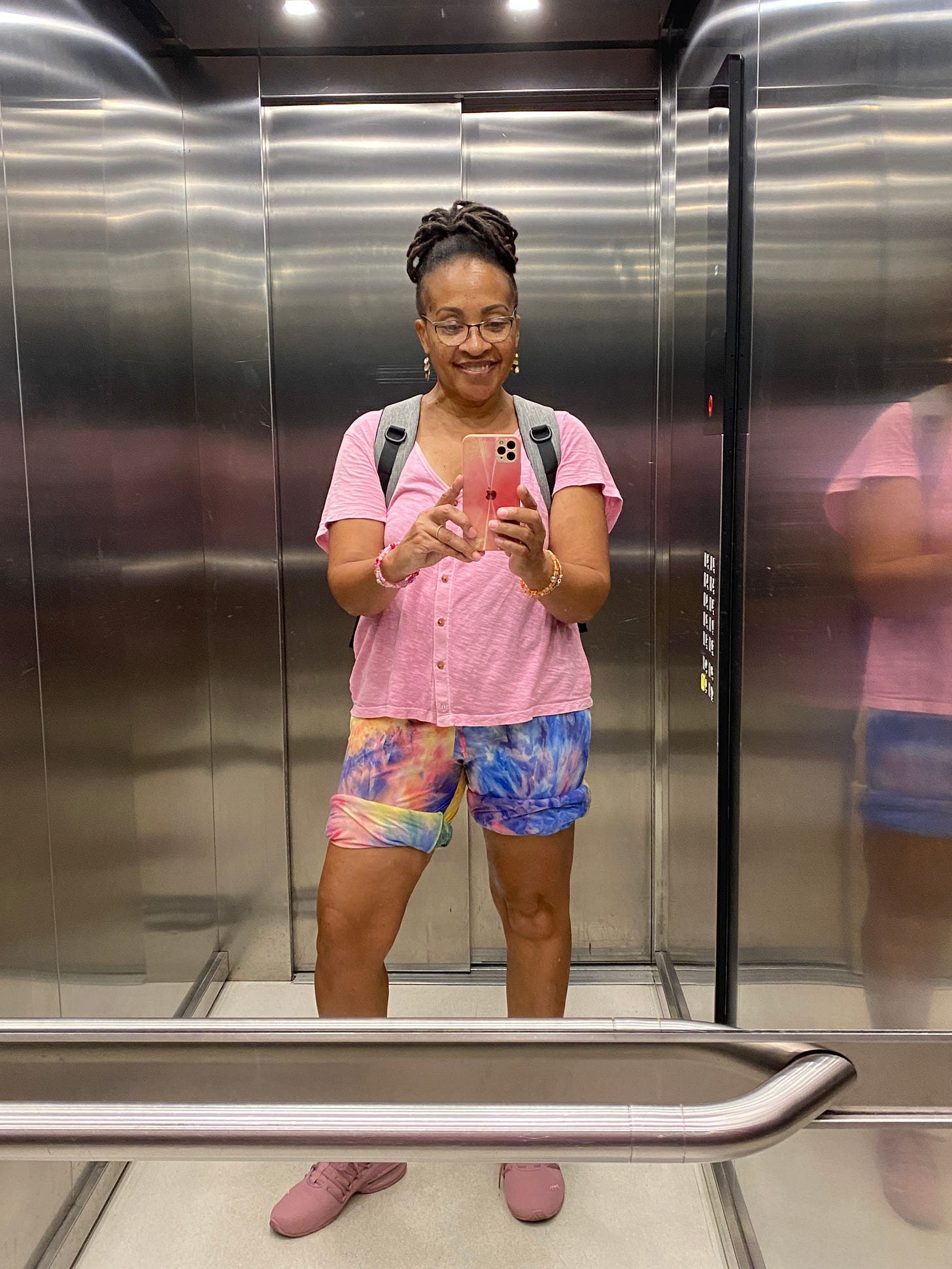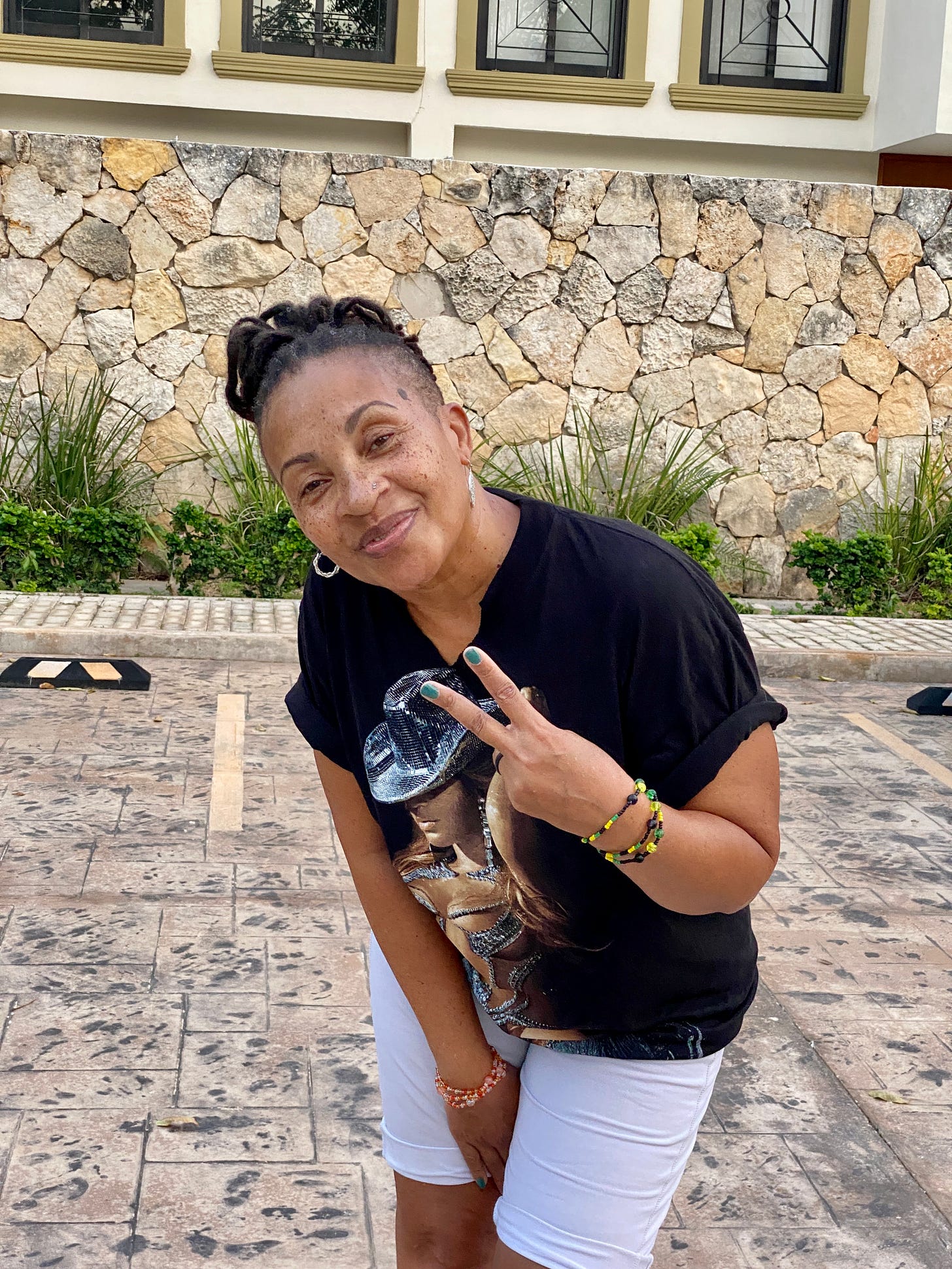In Praise of Loving the Sound of Your Own Voice
Audio journaling is a tool used routinely by scientists, documentarians, researchers, and other professionals. What about the rest of us? Why aren't more of us recording about our lived experiences?
Most people who know me in real life are often surprised when I admit how insecure I’ve always been. That’s because I spent my whole life—since adolescence—pretending to be fine/good under the worst of circumstances. By the time I reached adulthood, I was a pro at pretending.
The truth is, I spent the majority of my life secretly feeling unworthy and not good enough. Not good enough for some of the jobs I held; not good enough for a number of the friendships I was in; and also, not good enough for some of the people I loved (and still love).
For a long time, the journey of trying to fit in had me fucked up. Because I was orienting as an adult in society’s margins. As a woman and as a black person.
These days more and more outsiders/weirdos—I count myself among them—are speaking up on various social media platforms, on television, and in books, reminding everyone that the status quo isn’t always what we think it is. We’re out here.
The dream of life-swapping
I used to fawn over any woman who spoke highly of her tightly-knit family—how close she is with her mother, or with her daughter, or how close she is with her sister. Whenever a woman spoke of such things, my envying, covetous little heart used to leap.
In such instances I was like a nine-year-old at some other kid’s birthday party, beholding all her opened presents with my eyes saucer-wide like, Oooo! I want that! Can I touch it? Can I have one?
I used to gasp and make exclamations: It’s sooo sweet that you guys are so close! Wow! That is such a gift to share such closeness! Aww! Sisters who are friends too?—how fortunate you both are! You talk to your mother every day? Every week? Ugh! I wish! (As in, I wish I had the desire to talk with my own mother that often. I don’t.)
I fawned and I gushed because such lives seemed to epitomize my fantasies, stimulated wistfulness: if only I could have been born into such a life. I was earnest and sincere about these wants. I really thought—as a younger adult in my 20s and 30s and 40s—that such a life, that kind of existence was what I truly wanted. To be born into a loving family (not perfect, not without disagreements or misunderstandings, of course. No family is perfect) was the golden ring, the golden ticket. To be born into such a family was the prize that my hungry, thirsty heart needed.
For years, I honestly thought I was doomed.
Doomed by virtue of my own beginnings. How sad for me, how unfortunate to have been born into my own childhood family, riddled with trauma and damage. I thought I would be forever broken, even with healing. Sure, I could live among the normals, but I would always have the scars of my brokenness. I would never fit in with larger society. I would always be an outsider whose parents fucked her up. I would always be trying to catch up to others who appeared to have had a head start with normalcy.
Oh how wrong I was.
I have come to realize, life is not a race. Nor is my existence a competition to be compared with others. Of course, I got it all wrong—my initial views. Of course, I did. My parents were too broken to teach me the Truth of Life, too broken to model healthy adulthood for me. People talk about forgiving parents like that, parents who inflicted harm or damage. But as far as I’m concerned, there really is nothing for me to forgive. Not anymore.
Forgiving only served to confuse the issue for me.
Years ago, in my heart, I tried it. Regarding my parents, I told myself: it’s okay, you’re safe now, let go of the past, forgive them. So I forgave them and tried to move on.
But understand this: my parents were unrepentant and unapologetic about the pain they had caused. Not because they were mean and wanted to devastate me further. Rather, because they were incapable of owning—or admitting to—the wreckage created by their choices. These were two people born in the 1940s. Two individuals who, themselves, also came from devastating childhoods. Two people who grew up in a generation with differently held beliefs than my current generation; certainly different also than my own children’s generation. My parents were survivors of a harsher time with way less resources than we have today.
And so, my parents leaned heavily on ego and on pride. Survival instincts. Inside their (emotional) toolboxes were blunt, heavy instruments used primarily for self-defense and self-preservation. This is what I know now. I didn’t have this insight eight-plus years ago when these two devils were still torturing my soul.
I did what the general world and religious doctrine and respectability politics told me to do: I forgave my parents regardless of their inability or desire to change. It didn’t make me feel better to forgive. I never questioned my unease after forgiving them. I only noticed that forgiveness didn’t seem to help them and it certainly didn’t help me.
My parents continued to behave badly, frequently causing me reinjury. All I could do was set boundaries, limit my interaction with them, and try not to let thoughts of unforgiveness crush my soul. I tried to stay away from them as much as possible without creating too much confusion for my (adult) children.
I tried to make my own way, tried to find my own sense of normal, and live it. I lived the life I created for myself as a survivor.
The Magic of Audio Journaling
Eventually, I stumbled onto a miracle.
After quitting my office job to write full-time in 2016, I decided to document my writing journey as a way to keep myself company and also to track my writerly progress. I did this through private journaling in notebooks, through online blogging, and through the recording of audio journals.
Recording audio journals was an afterthought. I had no grand design about how these recordings might affect my writing life. I just figured they would be fun to listen back to during boring lulls when I wasn’t writing.
But I soon discovered a startling new world of camaraderie with myself—announcing goals I wanted to set, describing my work-from-home angst, venting about things I didn’t feel comfortable discussing with loved ones at the time.
At first, I made these recordings (on average) twice a month, listening back to them just as infrequently. But those earlier writing years were so lonely, it felt almost painful. I failed to anticipate the reality of following my writing dream to work from home. How the traditional work-life grind would continue for friends and loved ones—how things might change between them and me as a result. How I would no longer have co-workers to talk with during the day.
I began to battle my own mind—second-guessing, worrying if I made a mistake by quitting. Panicking about running through our small savings. Worrying about bills. Worrying about the growing divide between me and the people who I cared about who still had jobs in the real world. Worrying about my increasing otherness, how different my life was from everyone else. All these insecurities grew legs and arms in my thinking. While I slept, the insecurities morphed into giant threatening animals that chased me. Or they became large bodies of water that threatened to drown me before I could wake up.
I increased my time recording audio journals, recording entries at least twice a week. I started telling myself whole truths instead of all the partial truths I spent years training myself to speak. Secrets I was ashamed of. Fears and past hurt that I was subconsciously nursing like a bad habit.
I stumbled onto a new and special friendship . . . one with myself. Whoa! I found I actually liked her.
For the first time, I didn’t worry if I was talking too much in a given period. I didn’t worry if I was taking too long with “my turn” in the conversation as I recounted a story. I didn’t worry about taking up too much time and space in the relationship. At first, each of the recordings were 10 to 15 minutes long (nowadays each one averages 45 minutes). I felt my heart bloom with new love and understanding for myself.
For the first time, I understood the excited feelings of a little girl telling her mom about her school day, something I never experienced in my own childhood. The loving welcome of motherly encouragement. I kept a mirror on my desk and looked into my own eyes as I spoke. I saw love there. I saw eager invitation there. I saw joy and validation and understanding there. My eyes said, tell me more.
Audio journaling changed me. Not overnight, but over time. Gradually, I started to feel less ashamed and less embarrassed about my past. Slowly and surely, I began to feel more confident. What I was doing was re-parenting myself, giving the little girl inside of me all the love she had been missing. I made new promises to myself: I will love you as if I birthed you. I will always put you first. Nothing you do or say will ever disappoint me. I will never leave you. You are safe with me. I will always listen to your voice. I will always cheer for you. I will always cherish you.
I began to feel complete agency over myself. I felt powerful. I felt sovereign. The World became less intimidating to me. The World began to hold less sway over my thinking. I leaned away from the outer-world, and leaned more intentionally into my own inner-world.
Beautiful Reader, I’m sharing this testimony of self-friending as a reminder to each of us about our innate power. We can be and do anything. We are free to rewrite our own stories. We are free to create new story endings for our lives. It doesn’t matter who we are or where we came from. It doesn’t matter if we had one parent or two parents or no parents. It doesn’t matter if we had doting, loving parents. It doesn’t matter if we had unattentive, oblivious parents. It doesn’t matter if we had abusive, violent parents. It doesn’t matter if we were loved a lot or loved very little or loved not at all.
When this (American) society was formed, it did not have any of our interests at heart. Most of what we learned was WRONG. Most of what we were taught was designed to manipulate and control us. Now, I almost laugh out loud when I think of the phrase, That woman/man loves the sound of her/his own voice.
(Yes, I know. There are in fact some blowhards and motor-mouth people who enjoy sucking the life/energy out of a room full of people. But I’m not talking about them. I’m talking about the middle of the road, average human beings.)
And because we don’t want to be seen as annoying or too much or too needy, we shrink, hoping to be appreciated for our smallness.
What a trick! And it totally works. Not only do most of us shy from speaking up in groups (especially when we’re young), we also shy from talking out loud to ourselves. Even when we’re alone!
(Yes, I do love the sound of my own voice. So what?)
Selfies are commented on with disdain. Self-promotion is met with irritation. Self-prioritizing is considered selfish (especially for women). Anything that has to do with elevating oneself above the group is vilified. Fly under the radar and if you’re lucky, you’ll get a cookie or a pat on your head.
Those of us who suffered as children don’t stand a chance if we follow society’s bullshit rules about how to behave, how to LIVE.
Each of us gets this one precious life. Live it however you like. The more you do you, the more you are your truest self, the more you prioritize the child inside of you, the better off this world will be to have you in it. I love you. Keep shining your light.
Love, Mia 💕
Afterthoughts
The World doesn’t want us to know how amazing and beautiful and brilliant each of us really is. It’s why we’re taught to be humble (especially as women) and selfless and self-effacing. It’s why selfies are ridiculed and discouraged. But let me tell you something—no one is going to celebrate you like YOU. No one can love you as well as YOU can love yourself. When Muhammad Ali first began reciting poetry about his own talents as a boxer, the press railed against him. They hated it! And they tried to shame him for it. But he ignored them. When Oprah put her image on the cover of all her magazines, people snickered and made fun of her. Oprah ignored the naysayers. Kanye, Beyoncé, Nas, Rihanna, Cardi, and countless other celebrities. All endured haters for being too full of themselves. And all of them continue to win at life!
Meanwhile, the secret sauce that the world has been trying to keep from us all along is this: The more love you show yourself, the more you pour into yourself, the more you celebrate yourself, THE BETTER YOU BECOME. And when you understand how extraordinary you truly are, there is nothing that you can’t do. The sky is our only limit!











